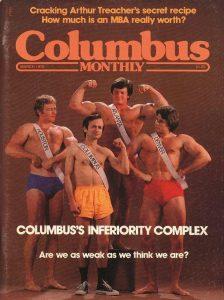
I saw a couple of recent reposts containing very interesting material from several decades ago in Charlotte and Columbus.
The first is a 25 minute TV special from the 1960s looking at a proposal to issue bonds to fund urban renewal in downtown Charlotte. A few things struck me about this. The first is that despite the video being labeled “Uptown Do or Die” by the local organization that posted it, Charlotte’s central business district is consistently referred to in the video as “downtown” not “uptown” as people do today. It’s interesting to note that the Uptown nomenclature is ahistorical and it makes me wonder when the rebranding took place. Also, there’s an economist in there who makes some prescient remarks.
What’s also notable is the way that the condition of downtown Charlotte is framed and the logic of urban renewal (including street widening, demolitions, etc). Similar rhetoric is used today to justify most major downtown civic initiatives. Also, you can see the business owners who opposed urban renewal at the time, but also one who was initially positive after it happened and he was able to relocate his business into a new strip mall. (It appears perhaps some later footage was spliced in for this).
It’s definitely worth a watch. Click over to watch on YouTube if the video doesn’t display for you.

The second is an article from a 1978 issue of Columbus Monthly magazine called “Columbus’ Inferiority Complex.” The magazine just reposted it, and it’s a great window into the psychology of the city from that period of time. Similar psychologies have driven a lot of the views and decisions of people in some of the Midwest cities by those who remember or came of age in those eras. I’m pretty sure Columbus really was that boring back in the 1970s, but things have changed a lot since then.
"Oh, you will find little pockets of boosterism. You’ll find it in official places, of course, like the Chamber of Commerce and various business and civic organizations … and you’ll find it in private places, like a small but-comfortable living room in Wyandotte North Apartments on the far north side where a middle-aged man is saying, “Sure I like Columbus. It’s an easy city to live in. It’s easy to go out and eat, easy to go to a movie, easy to get to the airport. There’s no hassle here.” Or the younger man, sitting in a large, sunlit study in a Sessions Village home: “Columbus is a terrific place to be right now. Ten years from now, it’s going to be one of the really great cities in the country. People are doing things here. The economy is stable, the racial situation has always been good, politics and government are clean, there’s a tremendous amount of building going on Downtown.”
There is an old parody of an old saying, though, which a lot of Columbus people seem to believe fits this city unusually well: “It’s a great place to live, but I wouldn’t want to visit here.”
Much is implied. That old wisecrack seems to acknowledge all the frequently-heard comments about Columbus being an easy place to live. It says, too, that the city is a safe place to live—physically and mentally. But the point of it is that Columbus is also a … well, a blah city. That nothing ever really happens here. That we have nothing to be famous for—no Superdome, no Guggenheim Museum, no Golden Gate Bridge, no Disney World, no White House, no San Andreas Fault … not even the Cincinnati Reds, Kings Island, Maisonette Restaurant, Cleveland Browns or Cleveland Orchestra. John Denver has never sung the praises of our terrain. We host a big tennis tournament and the stands sink into the mud, and the only way Columbus (that’s “Columbus, Ohio”) gets mentioned by David Brinkley is if the city gets hit by a foot and a half of snow… at the same time everybody else gets hit.
These are some of the things that prey heavily upon people’s minds as they gaze out the windows of their homes and offices and think to themselves, “God, what a hick town.” Some of them substitute “one-horse town” for “hick town.” Some of them substitute a one-word expletive for the whole thing.
The simple fact is that Columbusites have a whopping inferiority complex."
Click through to read the whole thing.
This piece originally appeared on Urbanophile.
Aaron M. Renn is a senior fellow at the Manhattan Institute, a contributing editor of City Journal, and an economic development columnist for Governing magazine. He focuses on ways to help America’s cities thrive in an ever more complex, competitive, globalized, and diverse twenty-first century. During Renn’s 15-year career in management and technology consulting, he was a partner at Accenture and held several technology strategy roles and directed multimillion-dollar global technology implementations. He has contributed to The Guardian, Forbes.com, and numerous other publications. Renn holds a B.S. from Indiana University, where he coauthored an early social-networking platform in 1991.












